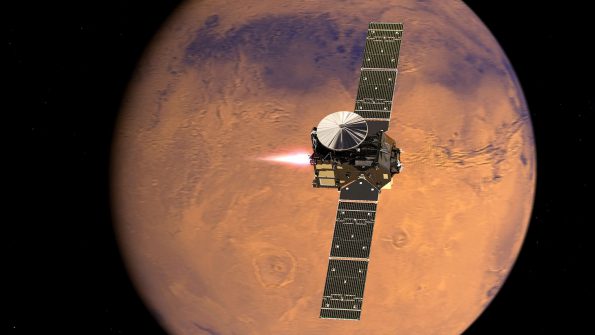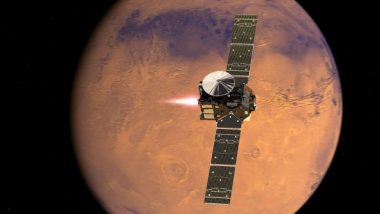

After launching to Mars in 2026, the Mars Sample Fetch Rover will retrieve Mars samples left by the Mars2020 rover. This NASA rover will leave 36 pen sized sample tubes on the Martian surface ready to be collected later. The Sample Fetch Rover will pick up the sample tubes, carry them back and load them into a sample container within the waiting Mars Ascent Vehicle. The Mars Ascent Vehicle will then launch from the surface and put the sample container into orbit about Mars.
As a third part of the mission, ESA’s Earth Return Orbiter, will capture the basketball sized sample container orbiting Mars, seal it within a biocontainment system, and bring the samples back to Earth. The samples will re-enter Earth’s atmosphere and land in the USA before the end of the next decade. Scientists from around the world will then be able to study the samples in using the latest laboratory equipment and analysis techniques for years to come.
Patrick Lelong, Project Manager by Airbus for the Earth Return Orbiter study, said: “Our long experience in complex scientific exploration missions such as Rosetta, BepiColombo and Mars Express will be a great asset for this study. The mission is technologically very challenging, but the prospect of seeing a sample of Mars returning to Earth is very exciting.”
Ben Boyes, Project Manager by Airbus for the Sample Fetch Rover study, said: “With the combined expertise of ESA and NASA, this landmark mission is ambitious and technologically very advanced, with two rovers interacting together on Mars for the first time. A double first of launching from the planet’s surface and the in-orbit transfer of the samples means it will be possible for the first time to directly study Mars soil in laboratories on Earth.”
David Parker, Director of Human and Robotic Exploration at ESA, said: “Bringing samples back from Mars is essential in more than one way. Firstly, to understand why Mars, although it is the planet that is most similar to Earth, took a very different evolutionary path than Earth and secondly to fully comprehend the Martian environment in order to allow humans to one day work and live on the Red Planet. I am very pleased that with these two studies now being commissioned and in combination with other studies conducted elsewhere in Europe we make another important step to explore Mars.”
Both Sample Fetch Rover and Earth Return Orbiter are part of ESA-NASA’s proposed Mars Sample Return mission that is looking to be approved at the 2019 ESA council at ministerial level.







